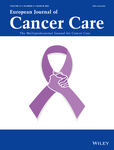Survivorship transition care experiences and preparedness for survivorship among a diverse population of cancer survivors in New Jersey
Funding information: Rutgers Cancer Institute and RWJ Barnabas Health Mission Support
Abstract
Objectives
The aims were (1) to characterise preparedness for survivorship and (2) to evaluate sociodemographic, medical, survivorship care transition experiences (e.g., receiving a survivorship care plan), practical (e.g., cancer-related financial hardships and information needs) and psychological (e.g., fear of recurrence) factors with preparedness for survivorship.
Methods
Three hundred and forty-six residents of Southern New Jersey who were diagnosed in 2015 or 2016 with bladder, breast, gynaecological, colorectal, lung, melanoma, prostate or thyroid cancer were identified and consented by the New Jersey State Cancer Registry. Participants completed a questionnaire assessing preparedness, provider care transition practices, financial hardships, information needs and fear of cancer recurrence. Correlations and multivariate analyses were conducted to identify factors associated with preparedness for survivorship.
Results
Participants reported feeling somewhat prepared for survivorship. More than half reported not receiving a written survivorship care plan and many desired more information about follow-up tests, symptoms monitoring and maintaining good nutrition and health. Receipt of chemotherapy, limited transition care planning, limited discussion of medical and psychosocial effects, high information needs and financial hardship were predictors of low preparedness.
Conclusion
Identifying and addressing factors associated with survivorship preparedness at end of treatment and over cancer survivorship trajectory will foster higher quality survivorship experiences.
CONFLICT OF INTEREST
The authors declare that they do not have any conflicts of interest.
Open Research
DATA AVAILABILITY STATEMENT
The data that support the findings of this study are available on request from the corresponding author. The data are not publicly available due to privacy or ethical restrictions.




